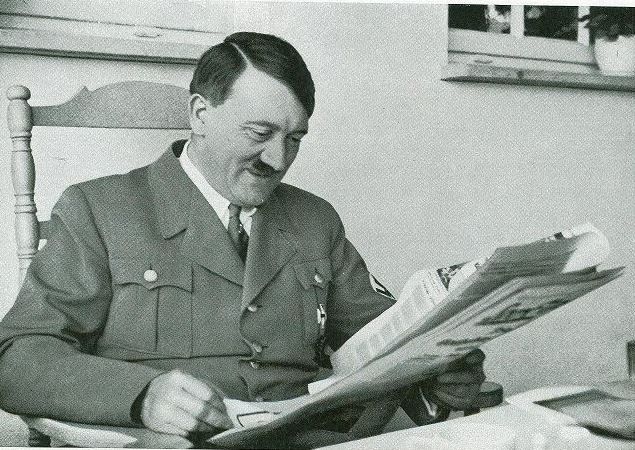Germany, Military Decisions - Adolf Hitler had planned 26 August as the date of the invasion of Poland, and this plan continued until the early evening of 25 August 1939. The pact with the Soviet Union of the previous day (dated 23 August) had seemed to make this a date certain. However, several events suddenly happened to cause a change in plans, and Hitler postpones the invasion of Poland at the last minute.
First, the Luftwaffe's intelligence service (the Forschamgsamt) reports that Italian Foreign Minister Count Ciano was preparing to inform Berlin that Italy would not participate in an invasion. Second, the French ambassador informs Hitler that France would honor its defense guarantee to Poland. Third, news reports say that Great Britain also now has ratified a similar agreement with Poland. All three events were completely unexpected.
All of this rattles Hitler. He had been relying on advice from his own foreign minister von Ribbentrop that the western powers would stand aside. He also had taken Italian support from his friend, Italian Duce Benito Mussolini, for granted. Hitler tells General Keitel to "Stop everything!" and later states that the postponement will only be for "four or five days." Hermann Goering, meanwhile, continues using a businessman intermediary, Swede Birger Dahlerus of the Electrolux company, to remove Great Britain from the equation. Dahlerus, who is engaging in perhaps the first instance of shuttle diplomacy, is in London this day acting as an unofficial German ambassador. However, he has little to work with and is not making much progress.
Terrorism: Five people are killed in an explosion in Coventry. Police quickly suspect the IRA.
Future History: Director John Badham is born on 25 August 1939. He becomes famous in the 1970s for films such as "Saturday Night Fever."
December 20, 1924: Hitler Leaves Prison
September 18, 1931: Geli Raubal Commits Suicide
November 8, 1932: Roosevelt is Elected
30 January 1933: Hitler Takes Office
February 27, 1933: Reichstag Fire
March 23, 1933: The Enabling Act
June 20, 1934: Hitler Plans the Night of the Long Knives
June 30, 1934: Night of the Long Knives
August 1, 1936: Opening of the Berlin Olympics
September 30, 1938: The Munich Agreement
November 9, 1938: Kristallnacht
August 1, 1939: Flight Tests of B-17 Flying Fortress
August 2, 1939: Einstein and the Atom Bomb
August 7, 1939: Goering Tries to Broker Peace
August 14, 1939: Hitler Decides To Attack Poland
August 15, 1939: U-Boats Put To Sea
August 16, 1939: Incident at Danzig
August 20, 1939: Battle of Khalkhin Gol
August 22, 1939: Hitler Tips His Hand
August 23, 1939: Ribbentrop-Molotov Pact
August 25, 1939: Hitler Postpones Invasion of Poland
August 27, 1939: First Jet Flight
August 31, 1939: The Gleiwitz Operation
2019
First, the Luftwaffe's intelligence service (the Forschamgsamt) reports that Italian Foreign Minister Count Ciano was preparing to inform Berlin that Italy would not participate in an invasion. Second, the French ambassador informs Hitler that France would honor its defense guarantee to Poland. Third, news reports say that Great Britain also now has ratified a similar agreement with Poland. All three events were completely unexpected.
All of this rattles Hitler. He had been relying on advice from his own foreign minister von Ribbentrop that the western powers would stand aside. He also had taken Italian support from his friend, Italian Duce Benito Mussolini, for granted. Hitler tells General Keitel to "Stop everything!" and later states that the postponement will only be for "four or five days." Hermann Goering, meanwhile, continues using a businessman intermediary, Swede Birger Dahlerus of the Electrolux company, to remove Great Britain from the equation. Dahlerus, who is engaging in perhaps the first instance of shuttle diplomacy, is in London this day acting as an unofficial German ambassador. However, he has little to work with and is not making much progress.
 |
| Birger Dahlerus. |
Future History: Director John Badham is born on 25 August 1939. He becomes famous in the 1970s for films such as "Saturday Night Fever."
Pre-War
8-9 November 1923: Beer Hall PutschDecember 20, 1924: Hitler Leaves Prison
September 18, 1931: Geli Raubal Commits Suicide
November 8, 1932: Roosevelt is Elected
30 January 1933: Hitler Takes Office
February 27, 1933: Reichstag Fire
March 23, 1933: The Enabling Act
June 20, 1934: Hitler Plans the Night of the Long Knives
June 30, 1934: Night of the Long Knives
August 1, 1936: Opening of the Berlin Olympics
September 30, 1938: The Munich Agreement
November 9, 1938: Kristallnacht
August 1, 1939: Flight Tests of B-17 Flying Fortress
August 2, 1939: Einstein and the Atom Bomb
August 7, 1939: Goering Tries to Broker Peace
August 14, 1939: Hitler Decides To Attack Poland
August 15, 1939: U-Boats Put To Sea
August 16, 1939: Incident at Danzig
August 20, 1939: Battle of Khalkhin Gol
August 22, 1939: Hitler Tips His Hand
August 23, 1939: Ribbentrop-Molotov Pact
August 25, 1939: Hitler Postpones Invasion of Poland
August 27, 1939: First Jet Flight
August 31, 1939: The Gleiwitz Operation
2019

No comments:
Post a Comment